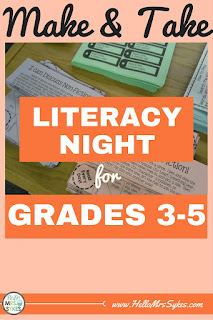Beyond Oral Reading Fluency ~ Dig Deep
The Reality of Oral Reading Fluency
Often, teachers are asked to give too much importance to a bit of data. The current trend is a focus on Fluency in struggling readers, particularly in grades 2-5. The Oral Reading Fluency score (ORF) is simply a look at how many words the student read correctly in a minute. If it is below the magic number, the teacher needs to take a closer look. The magic number varies, depending on the grade of the student, the time of year, and if you are using DIBELS, mClass, EasyCBM.com, etc.Here comes the tricky part - looking past the oral reading fluency to why the student is struggling. Too many teachers are being asked to provide an intervention in fluency, when that might not be the issue at all. Teachers and parents spend tons of time reading (and timing their students!) with the goal of reading faster.
That's right. The goal is to read faster. They chart it, celebrate when the numbers rise, and fret when the numbers stay the same. All with one purpose: read faster.
As parent and a teacher, this is scary. Often, the problem isn't fluency. It's from gaps in phonics skills. Student, teacher, and parent - stressing over how fast the student reads, and it isn't the underlying cause. Worse, the underlying cause is never addressed, which leaves the student at risk for a long time.
Look Past the Numbers ~ Dig Deep
What's a teacher, administrator, and parent to do? Dig Deep by going beyond the fluency score. It takes a bit more time, and that is important to consider. No teacher has enough hours in the day, between returning phone calls, helping a sick student, attending meetings, and teaching.Here's my answer: take the time to Dig Deep and find out what they need. This time is well spent. If you identify an area of deficit, like long vowels, simply provide your intervention on this one area. Need help? Click here for my blog series: Supporting Struggling Readers in Grades 3-5.
Observe Your Struggling Reader
Once you've Dug Deep to pinpoint their area of need, take the time to observe and listen to your struggling reader at least several times per week. Extra points if you can do this daily. ;) Do not underestimate the power of your anecdotal notes. Pull them out, look them over, and see what the group (or the student) needs. Here are a few examples:
My R5 Group: Rydell needs to work on chunking unfamiliar words and attending to endings of words. Ellington uses the beginning of a word to identify an unknown word, and needs to work on "Does this make sense?"
My 90210 Group: Brenda's pencil grip is really forceful - OT referral? Dylan is using visual cues (beginning of the word) to identify unknown words. He needs to work on: "Does this make sense?" Brandon uses meaning cues, and needs to work on: "Does it look right?"
Molly Lou Mellon is in a different group, where I happen to use one page per student. {This helps me look for patterns in the students over time.} Molly Lou is working on attending to word endings, while asking herself: "Does it sound right?"
If you're having trouble analyzing the anecdotal notes to see what they need, here's a free Word Work Cheat Sheet for Struggling Readers in Grades 3-5.
As you work with students, remind yourself to dig deep, observe, and listen. Happy Teaching, Friends!
My R5 Group: Rydell needs to work on chunking unfamiliar words and attending to endings of words. Ellington uses the beginning of a word to identify an unknown word, and needs to work on "Does this make sense?"
My 90210 Group: Brenda's pencil grip is really forceful - OT referral? Dylan is using visual cues (beginning of the word) to identify unknown words. He needs to work on: "Does this make sense?" Brandon uses meaning cues, and needs to work on: "Does it look right?"
Molly Lou Mellon is in a different group, where I happen to use one page per student. {This helps me look for patterns in the students over time.} Molly Lou is working on attending to word endings, while asking herself: "Does it sound right?"
If you're having trouble analyzing the anecdotal notes to see what they need, here's a free Word Work Cheat Sheet for Struggling Readers in Grades 3-5.
As you work with students, remind yourself to dig deep, observe, and listen. Happy Teaching, Friends!










Comments
Post a Comment
I love to hear from you. Thanks for supporting my tiny corner of the internet.